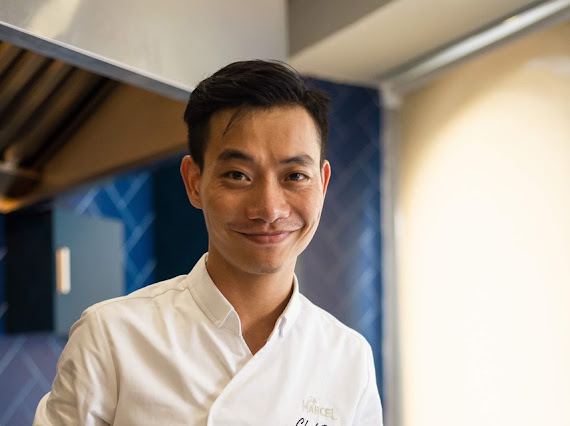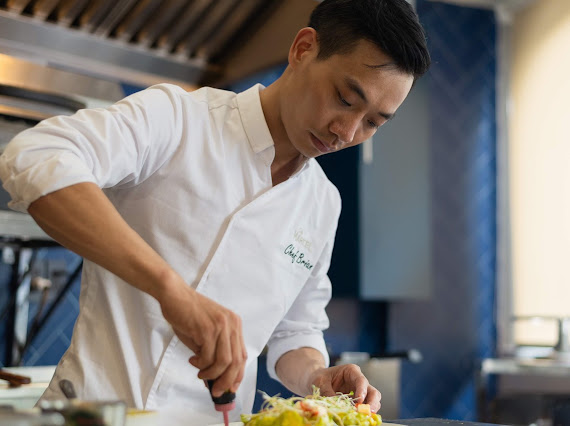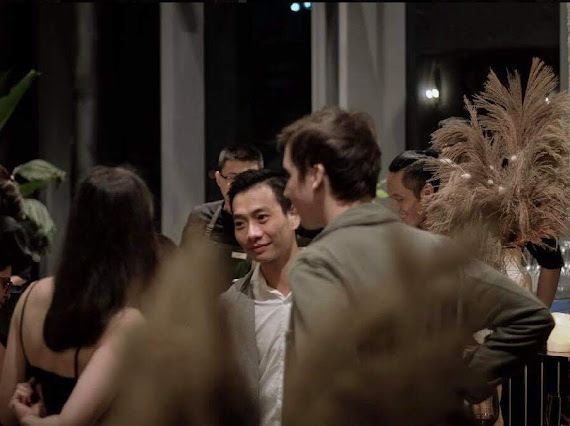
Chef Chu Quang Luận. — Photo courtesy of the artist
Vietnamese people are now having the chance to enjoy many culinary styles. Therefore, cooking has become an art and becoming a chef has been recognized in the country. Many young people are now choosing to become a chef. Each has different ways, including mixing Vietnamese and foreign cuisine or bringing authentic foreign cuisine to the country. Việt Nam News talked with a young chef, Chu Quang Luận (Brian Chu), who brings French cuisine to the country.
Inner Sanctum: We would like to know more about you and your career. Can you please tell us about yourself?
Hello, my name is Chu Quang Luận or Brian Chu. I am head chef of Détour Restaurant in District 7 of HCM City.
I'm 32 years old. I became a chef very early at 19 years old. My style is almost French cuisine with local materials, respecting the traditional with a small twist. Sometimes, I use Japanese techniques also for fish and seafood. I still want to learn more about cooking, especially French technique and culture.
Inner Sanctum: Many Vietnamese people don’t have good perception about being a chef and many young people prefer office work rather than a cooking career, why did you choose to become a professional cook?
From a young age, I was helping my mother and old neighbours prepare meals. I also cooked for myself before going to school. Picking up vegetables from our garden and free range chicken to cook in the countryside are the best memories of my life. From that, I have been in love with cuisine. I was not a fan of numbers in school, but always curious about vegetables or how to debone a fish perfectly; that's why after high school I went directly to a cuisine class.

Chef Chu Quang Luận prepares a dish for his customer. Luận started cooking since 19 and now is the chef of a French Restaurant in HCM City. — Photo courtesy of the artist
Inner Sanctum: How did you begin your culinary career and what challenges did you face in those early days?
I started my career early when I went to Hồ Chí Minh City working with my friend in a bar. Later, I went around to find a real restaurant to work at and fell in love with French cuisine.
I worked in some eateries for four to six months each. I changed where I worked really quickly but I can say my luck is to work under chef Sakal Phoeung at La Maison Restaurant. He is the best chef I have ever met. He was really organised, consistent and always inspired young people.
When I worked with him, I got a lot of energy on how to lead a kitchen team.
The challenge for me is foreign languages. If you want to learn more or be a professional, you must learn English. If you can, please learn French also.
Then, you learn more about organising your kitchen, working with product and hygiene. It needs to be involved everyday in your life.
Inner Sanctum: When you set out to create your dishes. What is your inspiration for selecting French cuisine and how did you bring Vietnamese flavours into them?
When I start to think about a new dish, I always think about the beauty of the products here. Why do you take the lobster to travel around the world to cook instead of the local lobster or king prawn - it is so fresh and really good quality. When you get a good product, you do good seasoning and a bit of technique using a touch of local herbs also. The recipe totally changes but it is amazing for the customer and lighter, not too much fat, cream - it must be healthy.

Chef Chu Quang Luận at a meeting with customers. — Photo courtesy of the artist
Inner Sanctum: How does your South of France concept differ from other French restaurants?
I can say that my dish is seasonal and local. We use local products as much as we can.
We do not bring a fine dining concept. All things in here are comfortable but with care of product and customer service. You can eat brunch from 9am or from 6pm with a glass of wine and apero like a French onion soup - we take Đà Lạt onion and cook slowly with beef stock for an hour, after that we served it with bread like ‘Tartin’ with parmesan foam and chive. The dish has so much umami flavour.
Inner Sanctum: Comparing yourself to other chefs in the country, what do you consider your strengths?
It's hard to say but at Détour, I can work with a lot of amazing products from our farm in Đà Lạt, building the plate with comfort and respect for tradition. Nowadays, many young chefs go too fast or do trendy cooking but forget the basics.
Inner Sanctum: Chefs are perceived to be hard workers by many Vietnamese. How would you describe this perception?
That's true. Becoming a chef is not easy, you should learn a lot of things besides how to make perfect dishes for the client. We should learn how to build a good team, learn about balancing your recipe and profit for the restaurant. You should find a style for your cooking, what kind of cuisine you want to go with it and do it seriously for your whole lifetime.
Inner Sanctum: Have you thought about bringing Vietnamese cuisine to other countries? Are there any strengths or weaknesses of Vietnamese cuisine, and what can we do to promote it internationally?
Yes! We all love our food and our culture. Vietnamese cuisine is the best - raw, healthy, light, balanced taste with a lot of amazing aromatic herbs and spices around the country. But if we want to go far, we should do without monosodium glutamate (MSG) and less sugar.
We bring the beauty of products like herbs and spices and bring it so far with a bit of western technique then all that is perfect to promote Vietnamese cuisine to the world. VNS
OVietnam